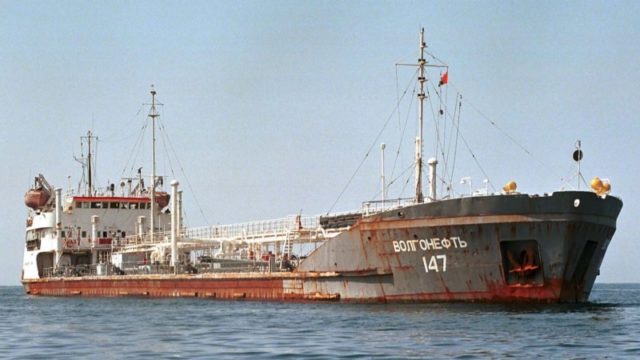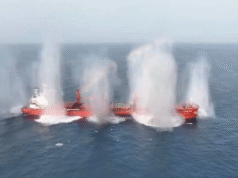According to the British publication, Russia needs to expand its tanker fleet in order to redirect oil supplies to countries that are farther from Russia than Europe, and the path of each flight will increase. Next week, an OPEC+ meeting is expected to discuss the agreement by the EU countries of the maximum price for Russian oil.
Russia is forming a “shadow fleet” of tankers to sell oil to new buyers in the face of Western oil sanctions. It is reported by the Financial Times . More tankers than usual are needed because the path of each flight will increase. After all, instead of Europe, they will go, for example, to India and China.
The EU ban on the sea transportation of Russian oil comes into force on December 5. And a price ceiling of $60 per barrel has already been set. If oil becomes more expensive, then the EU and G7 measures will cut Moscow off from a significant part of the world’s tanker fleet, since insurers, including such large ones as Lloyd’s of London, will be prohibited from insuring ships with Russian oil, regardless of their destination, if it is not sold at limited price. However, while oil prices are under the ceiling and meet the interests of the Russian budget.
Alexey Belogoriev, deputy director of the Institute of Energy and Finance, comments :
– Since the price ceiling is now set at or even significantly below the average selling price of Urals, according to various estimates, Russian companies will obviously continue to massively use European freight in the coming weeks and even months, that is, they receive, in fact, a delay in order to solve the current problem of diverting supplies from Europe of 700 thousand barrels per day, which fall due to the embargo introduced from December 5. Plus, about 150 thousand barrels will be added to this after Germany and Poland stop importing Russian oil through Druzhba, this will happen from January. Now there is no threat that there will be an acute shortage of tankers due to the refusal of European companies to work with Russia. This problem will be postponed until spring, apparently, so the companies still have time to find tankers on the market. This is not an easy task, although the shadow market for tankers is quite large, but these are, as a rule, very outdated vessels, many of them simply need to be written off, that is, they require repairs, at least quite expensive maintenance. The question arises to what extent these vessels, which are currently being purchased, can be used promptly. That is, if we imagine that Russian companies completely stop working with European freight – Greece, Cyprus, Malta – there will be a deficit anyway.
– How does Russia respond to the ceiling?
— Nowhere in the contracts with contractors, be it insurance companies or freight, is it stated that the counterparties are somehow politically biased and adhere to the price ceiling, that you can’t work with them. Companies also do not record anywhere that they work and will work taking into account the price ceiling. If the market price for the sale of Russian oil falls within the price ceiling, then nothing will be fixed anywhere and nothing will change.
The Russian Ministry of Finance announced on December 1 that the average price of Russian Urals oil in November was about $66.5 per barrel, which is 16.5% less than it was in November 2021. The spot price for this grade rose by almost 4.5% the day before, to almost $69.5 per barrel.
According to the Argus price agency, which was quoted by Bloomberg , at the end of November, on the eve of Western sanctions, the cost of Urals with shipment from Novorossiysk and Primorsk collapsed to the lowest value since the end of 2020, about $52 per barrel.
G7’s initial offer is a cap price of $65-$70 per barrel with no adjustment mechanism. However, in the end, they agreed on a price cap of $60 per barrel, and the price cap will be reviewed in mid-January and then every two months to assess how the scheme works and respond to possible “turbulences” in the oil market that will arise. .
By purchasing tankers, Russia is preparing for a worsening situation , says Stanislav Mitrakhovich, a leading expert at the National Energy Security Fund :
– Some of these tankers used to carry Iranian oil, now they will carry Russian oil, it will not be possible to track this completely and stop these transportations, it is obvious that if the sanctions did not destroy the oil industry of Iran, then the Russian one will not be destroyed. And such measures as buying up the shadow tanker fleet can help us. What other alternative is carriers from friendly jurisdictions, and since the price cap is left at a price higher than the current quotes of Russian oil, it means that carriers from Europe will still be able to transport Russian oil, that is, friendly jurisdictions, their own Russian fleet, partly operating in shadow mode, plus European carriers operating under a price cap. This is enough for a few months, and then according to the circumstances. How much will be lost, I think, somewhere around 0.7 million barrels – 7, Russia exported 5 million barrels of oil and oil products, if 0.7 million is lost, consider that this is a tenth of exports. In general, I think that this is within reasonable limits that the Russian oil industry will survive. If the Americans arrest the tanker somewhere, then the old tanker is not so scary to lose. Western agencies wrote that up to 200 tankers of different capacities would be bought somewhere, this would not be enough, but since our price cap is set at 60, Russian oil costs a little over 50, which means that it will be possible to continue to transport with the help of Europeans . I do not rule out that Indian, Chinese, Middle Eastern shipping companies will appear now. which the Russian oil industry will survive. If the Americans arrest the tanker somewhere, then the old tanker is not so scary to lose. Western agencies wrote that up to 200 tankers of different capacities would be bought somewhere, this would not be enough, but since our price cap is set at 60, Russian oil costs a little over 50, which means that it will be possible to continue to transport with the help of Europeans . I do not rule out that Indian, Chinese, Middle Eastern shipping companies will appear now. which the Russian oil industry will survive. If the Americans arrest the tanker somewhere, then the old tanker is not so scary to lose. Western agencies wrote that up to 200 tankers of different capacities would be bought somewhere, this would not be enough, but since our price cap is set at 60, Russian oil costs a little over 50, which means that it will be possible to continue to transport with the help of Europeans . I do not rule out that Indian, Chinese, Middle Eastern shipping companies will appear now. it will turn out to continue to carry with the help of Europeans. I do not rule out that Indian, Chinese, Middle Eastern shipping companies will appear now. it will turn out to continue to carry with the help of Europeans. I do not rule out that Indian, Chinese, Middle Eastern shipping companies will appear now.
– What is the position of Russia?
– When the Russian government said that it would not supply oil to countries that would introduce a price cap, they meant countries outside the G7 and the EU, which officially said they would not buy oil if it costs more, than the marginal price. But there are very few countries that will publicly declare this, they may not exist at all, relatively speaking, some South Korea, maybe no one will say this at all. There is another meaning of the price cap, that the Russian government will not prohibit Russian companies from cooperating with Russian carriers in the current conditions. Because if Russian company X enters into an agreement with Indian company Y to sell oil, a contract for $52, that $52 is lower than the European price cap,
Russia has repeatedly stated that it will not export anything, including oil, if the cost of production is somehow artificially limited. And deliveries in this case will be redirected to partners who will not support the price ceiling, or oil production will be reduced. The day before EU oil sanctions go into effect, OPEC+ will meet. So far, there is no talk of changing the level of oil production.
Source:https://oiltender.com/







